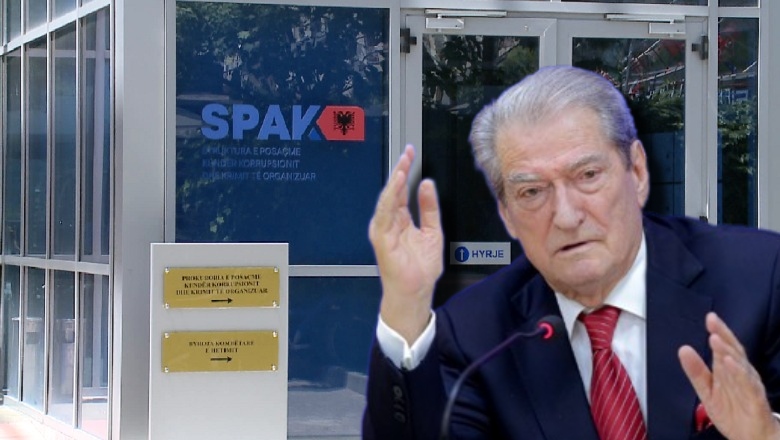SPAK’s dossier exposes scheme involving Sali Berisha and family

A comprehensive 500-page report compiled by the Special Prosecution Against Corruption and Organized Crime (SPAK) has shed light on the accusations of corruption against former Prime Minister and current leader of the Democratic Party, Sali Berisha. The file details the alleged illegal privatization of the Partizani Sports Complex in the heart of Tirana, and financial ties between Berisha, his family, and various associates. The allegations, include land deals, financial transfers, and manipulation of law for financial benefit.
- Privatization of the Partizani Sports Complex
The SPAK dossier outlines in detail how Sali Berisha, during his time as Prime Minister, facilitated the illegal privatization of the Partizani Sports Complex. Originally a military property with public investments and active sports facilities, its sale was prohibited by law. However, the investigation shows that Berisha, using his political power, pushed through legal changes to ensure his family would benefit financially from its privatization.
Soon after Berisha assumed office in 2005, his son-in-law, Jamarbër Malltezi, and other close associates began organizing the process to privatize the Partizani Complex. The complex was built on land owned by five families, including the Begeja family, to which Malltezi was an heir. The SPAK report highlights that Berisha orchestrated the alteration of legal frameworks to allow the sale of these properties, despite existing laws prohibiting such transactions. Berisha’s government passed specific government decisions (VKM) that bypassed legal restrictions on military properties, enabling his family to acquire the land at a low cost.
A key legislative change was the amendment to the law governing property restitution, which allowed former landowners, like the Malltezi family, to reclaim land used by the Ministry of Defense but not actively part of military operations. This amendment opened the door for the privatization of the Partizani Complex, which was supposed to remain a military asset.
After ensuring the legal framework was in place, Berisha’s son-in-law Malltezi submitted a request to privatize the complex, and within a year, four of the five families were granted ownership of their former land. The dossier reveals that this process was expedited at an unusual pace, with bureaucratic procedures being bypassed. The officials involved, including key figures in government institutions responsible for property restitution and zoning approvals, are accused of cooperating with Berisha’s scheme.
Moreover, it is detailed that Berisha used his influence to pressure state institutions and officials to move quickly on the privatization. One key official, Vladimir Qirjazi, a military officer who opposed the sale, was removed from his position after refusing to sign the necessary documents. He was replaced by General Xhemal Gjunkshi, who complied with Berisha’s demands, allowing the privatization to proceed.
The final legal hurdles were cleared when the zoning laws for the area were changed. In 2006, Berisha’s government rezoned the area from a “sports zone” to a “residential zone,” thus paving the way for the construction of luxury apartment buildings on the former sports complex. These amendments enabled the Berisha family to sell off the property for millions of euros, with much of the profit benefiting Jamarbër Malltezi and, indirectly, Sali Berisha himself.
SPAK’s investigation reveals that the entire privatization scheme was orchestrated to benefit the Berisha family financially, with legal frameworks manipulated at every step. This scheme exemplifies how state assets were transferred into private hands through political manipulation, resulting in large personal profits at the expense of the public.
- Financial Ties
According to Balkanweb, the SPAK dossier reveals how Sali Berisha financially benefited from his son-in-law, Jamarbër Malltezi. According to the report, in 2014, the Malltezi family transferred €24,000 to Berisha’s family, including €6,000 for medical expenses for Liri Berisha, the former Prime Minister’s wife. Additionally, Shkëlzen Berisha, Sali Berisha’s son, declared that he received €18,000 from Malltezi.
Further financial transfers are documented in subsequent years. In 2017, Berisha’s daughter, Argita Malltezi, provided €7,500 to cover her father’s medical expenses. That same year, $27,500 was paid to Shkëlzen Berisha’s lawyer in the United States for legal services, with Berisha claiming that this payment was interest-free.
The flow of money between Berisha’s family members continued in later years. In 2018, Jamarbër Malltezi paid €3,000 for Sali and Liri Berisha’s vacation, and in 2021, he contributed €20,000 towards legal fees for Berisha’s case against U.S. Secretary of State Antony Blinken. This lawsuit was filed following Berisha’s designation as “non grata” by the U.S., an action stemming from allegations of significant corruption during his tenure as Prime Minister.
In 2022, Berisha’s daughter, Argita, paid £72,000 to a law firm in the United Kingdom after Berisha was also declared “non grata” by the U.K. These legal battles continued into 2023 when Argita covered additional legal fees amounting to €201,000 and $54,000 for her father. The SPAK file also shows that in 2024, she paid €213,000 to a law firm to further defend Berisha in the ongoing investigation of his non grata status.
- Links to Damir Fazllic
Damir Fazllic, a Bosnian-Serb businessman with close ties to the Berisha family, also appears in the SPAK investigation. His ties to Sali Berisha’s family have attracted significant attention due to his involvement in several suspicious land transactions.
According to the SPAK file, Fazllic entered into a series of real estate deals with Jamarbër and Argita Malltezi. The couple purchased land and later sold it to Fazllic at inflated prices, generating substantial profits for all parties involved. These transactions were facilitated by Fazllic’s representative in Albania, Flutura Kola, who managed the deals and handled payments, which were often made in cash—a practice that raised suspicions of money laundering.
As the investigation continues, Berisha and his associates may face significant legal and political consequences for their involvement in these corrupt practices.


